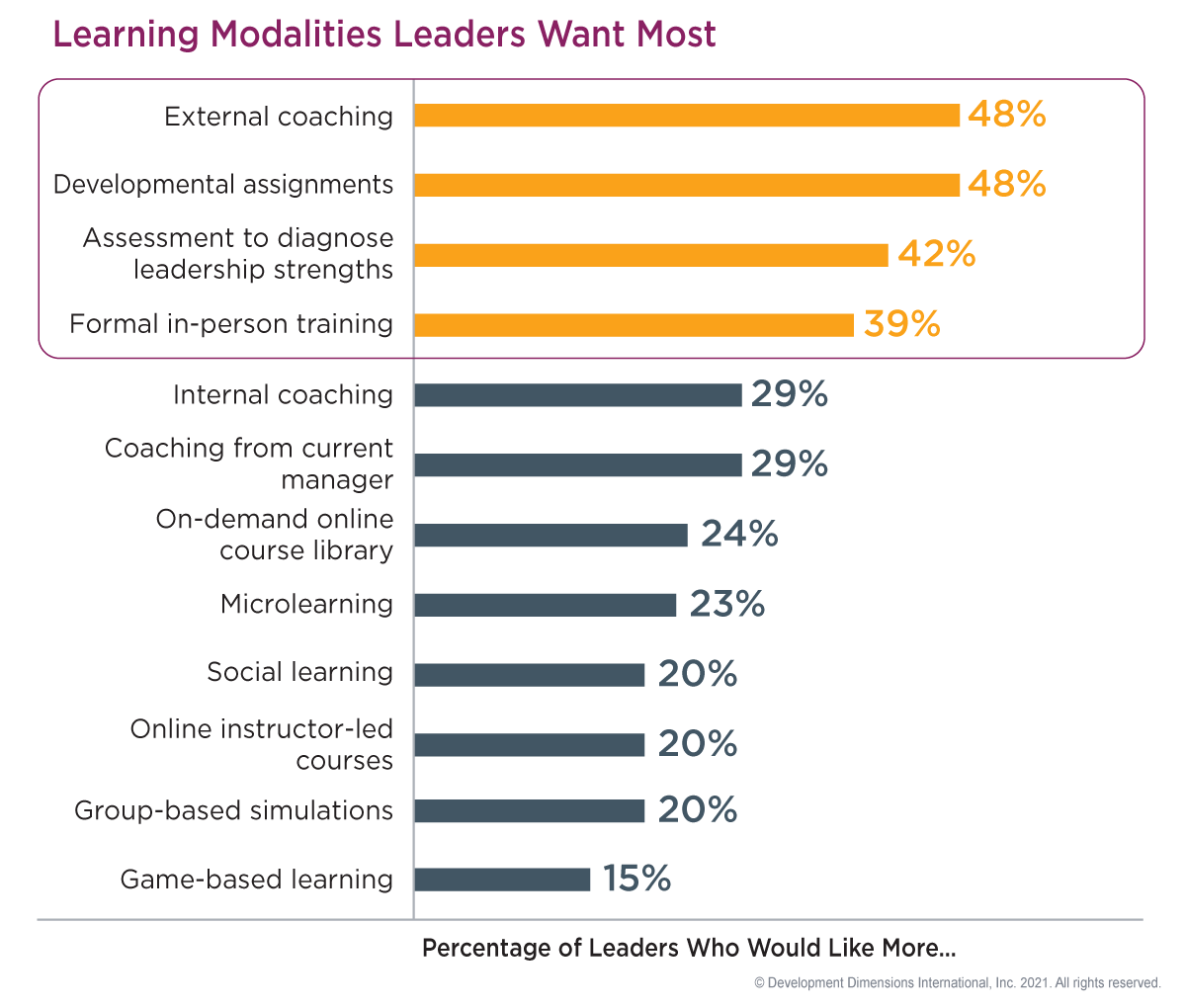On a scale of 1 to 10, how would you rate your coaching skills right now? For the last few coaching programs I’ve facilitated, I’ve asked participants this question. It’s a great way to help them reflect on their current skill set and get a baseline to start development. This question also introduces the key coaching competencies for managers and the skills needed to close any gaps.
I’ve found that most rate themselves a “5 or below” on general coaching skill level. And then a few typically rate themselves an “8 or above.” But regardless of rating, all participants agree there is room for improvement. While coaching is a skill leaders want to get better at, it’s also something leaders themselves want more of and something their team members are craving. Coaching is a key enabler of learning in the flow of work.
According to DDI’s Global Leadership Forecast 2021, most leaders are asking for more personalized and objective development experiences. This includes coaching to better understand their strengths and grow their leadership skills. Coaching from external coaches, internal coaching (including peer coaching), and coaching from their current manager make up three of the top six learning modalities leaders want more of.
Not to mention, companies engaged in any sort of change or transformation (are there any that aren’t?) recognize that building their leaders’ coaching strategies and fostering a coaching culture is crucial. Why? Well, if companies want to transform, they need an environment where giving and receiving feedback is encouraged, bold thinking and action are common, and workers are engaged and productive. And these are all benefits of having a culture that supports coaching.
What Does Coaching Look Like in the Workplace?
When I first studied coaching in the workplace, I learned that it is a conversation like no other. It is both an attitude and a behavior. And it is as much about the approach as it is the outcome. Ultimately, coaching is about helping individuals or teams achieve the best outcomes.
As a beginner coach, I felt pressure for each coaching conversation to yield great results. But over time, I’ve learned that while coaching can look different across different situations, the objective is always the same. At its heart, it aims to help the other person or team achieve an outcome they can’t achieve on their own at that time.
And sometimes, as a coach, you don’t get the satisfaction of knowing in the moment if your coaching has had an impact. But it’s not about you as the coach. Good coaches create a relationship based on trust. They do this by applying the right mix of interpersonal skills and influence to meet the other person’s needs in the moment.
Thus, coaches trust that their coachee has within them everything they need to be successful on the job. The coach’s role, therefore, is to engage in a conversation that addresses both the personal and practical needs of the coachee. This helps to energize the coachee towards achieving their goal. It also supports them through the ups and downs of that pursuit.
Coaching Moments Are Key
We’ve all experienced times at work where we’ve found ourselves facing something we’ve never done before. Even more common is that something isn’t going so well. Or you’re stuck in a working relationship that’s just not working. These are all situations where coaching can really help. Whether informally or formally, a coach at these moments can help to:
- Remedy a performance problem.
- Prepare someone for a new assignment.
- Empower the team.
- Challenge an individual or team to stretch their performance.
But coaching isn’t reserved just for performance problems. A coaching participant often wants to get better at a certain skill or get ready for a new role. In fact, when coaching effectively, leaders spend most of their coaching time setting people up for success. This includes providing feedback, being supportive, challenging thinking to stress-test ideas, being nondirective, and helping team members perform at their best.
Tips to Get Really Good at Coaching
The International Coach Federation (ICF) outlines a core coaching competency model that addresses the key coaching standards, which apply to any coach, peer coach, or leader-as-coach. Based on the ICF’s coaching competencies for managers, here are some tips and key actions to have an effective coaching conversation.
1. Check your coaching mindset.
It turns out that mindset might be the most crucial of the coaching competencies for managers. Having the right mindset is key to having successful coaching outcomes.
Mindset expert Carol Dweck’s research uncovered two types of mindsets: growth and fixed. People with a growth mindset recognize that challenging situations and even failure present a tremendous opportunity to learn and to develop talents, skills, and intelligence. Failure challenges growth-mindset people to perform better.
People with a fixed mindset associate challenges and failure with their innate ability to perform. Success and failure is a reflection of how smart or skilled people are, rather than a result of effort or actions taken. Imagine if, as a coach, you approach your coachee with a fixed mindset. You believe they are incapable of undertaking an ambitious task or unlikely to change their behavior. Your body language and every word and action communicate a fixed or growth message.
So check in on your own attitude and beliefs about the person and their context to boost the chances of a successful coaching session. What if you believed your coachee could seize every chance to grow and develop?
2. Consider personal and practical needs.
A coaching conversation needs to address how the person is feeling about their situation (personal need) AND the goal that needs to be accomplished (practical need). These are the foundational elements of any conversation. For example, to figure out the personal need, try the empathy formula: “It sounds like you’re feeling______(emotion) because______(fact).”
And, to define the practical need, consider what the coaching process needs to address. For example, are you helping the person take on a new challenge, improve job performance, or resolve a conflict in a working relationship? In other words, help your coachee explore and get crystal clear on the challenge or opportunity in hand. Then, clarify why this is important for them so the goal has meaning and momentum.
3. Learn authentic listening: hear the story, emotion, and intent.
Authentic listening is one of the coaching competencies for managers that requires three levels of hearing so that you, as a coach, can then adjust your response. The three levels are:
- For content—hearing what the person is saying or the facts conveyed.
- For emotion—listening for the person’s underlying feelings.
- For intent—focusing on the underlying meaning of what the person is saying.
Most of us are used to listening at the content levels. For example, what if I told you that I’m going to miss an agreed-upon deadline for a report? And what if I also told you that I’m missing the deadline because I didn’t get the data I needed for the report, even though I had been diligent with my requests and persistent in my follow-up to colleagues to get me the data I needed? As a coach, it’s tempting to start the conversation here to solve the problem of the tardy report or the noncomplying colleagues.
However, if you were paying close attention to my feelings, you would likely correctly pick up that I was distressed and embarrassed by this. And, at the deepest level of listening, you might recognize that I didn’t actually know how to influence others to collaborate. And, if you started the conversation with empathy and some clarifying questions to see if your hypothesis about my intent were correct, I would feel heard, respected, and understood. This conversation would then indeed focus in on coaching the real personal and practical needs rather than the superficial needs present.
4. Balance seeking and telling.
One of the common myths about coaching is that it is all about asking powerful questions. If this were the case, then by inference, coaches would not be able to share their feedback, observations, thoughts, feelings, or rationale. Sharing all or many of these serves to build awareness and trust, provoke insights, or develop ideas for moving forward.
DDI’s ACE coaching model (Ask, Connect, Energize) is an adaptive coaching type focused on quickly establishing trust between the coach and coachee. The A in the model stands for “ask.” And when asking is done in the right way, it can be helpful in building trust quickly. Thus, the coach’s job is to clarify what’s going on and involve the coachee in the solution by asking questions.
Seeking more and telling less is a best practice in our model. Here are a few other valuable tips:
- Open-ended questions work best.
- Avoid leading questions. They tend to indicate you’re not really listening deeply or have projected too much of yourself into the coaching opportunity.
- Be selective on using a “Why” question—because the obvious answer to “Why?…” is “Because…,” forcing a naturally defensive position.
But the balance to a great question is a great insight, observation, or piece of feedback. I also call this a “tell.” But, just as questions are posed to be curious, nonjudgmental, open, and non-leading, so too is “telling.”

How to Be an Effective Coach
The next time you’re coaching, know that you’re also facilitating one of the best and most in-demand enablers of personal growth. Adopt a growth mindset, perhaps suspending some limiting, fixed-mindset beliefs about your coachee’s potential. In addition, harness the power of emotional intelligence and view people in a more positive light, which enables and respects the individual. And spend some time learning coaching best practices and coaching competencies for managers.
When you overlay this with a conscious effort to balance seeking (asking powerful questions) and telling (sharing observations, feedback, and insights), you encourage your coachee to think through situations on their own. This approach also makes it easier to gain their buy-in and commitment to a better way moving forward.
To learn more download an overview of our coaching program.
Dominique Powrie is Managing Consultant for DDI Australia, where she is an executive coach, facilitator, and leadership development consultant for a variety of industries. When not engaged with clients, Dom can be found on the sidelines of many a sports field, managing junior soccer teams or cheering on the netball, rugby, tennis, mountain bike, swimming, and cross country endeavors of her sports-mad family. After all that, she enjoys a great Aussie Shiraz!
Topics covered in this blog

